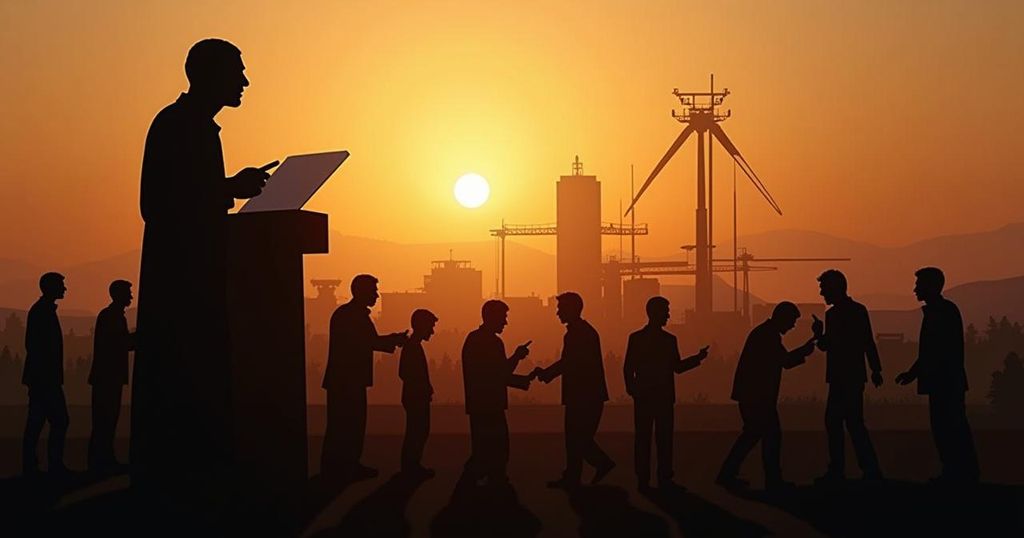Examining the Legitimacy Crisis in Tunisia’s Upcoming Presidential Election

Tunisia is approaching a presidential election on October 6, yet the political landscape is starkly different than in previous years, characterized by repression under Kais Saied’s regime. Support for Saied has waned as he continues to imprison dissenters, stifle media, and manipulate electoral processes. While many citizens express a desire for democratic restoration, the election’s integrity is severely compromised, leading to widespread protests against Saied’s rule, indicating potential challenges to his authority.
A traveler in Tunisia today might not immediately recognize that a presidential election is imminent, scheduled for October 6. Unlike past elections characterized by vibrant rallies, robust debates, and a plethora of candidates, the political landscape now appears muted and somber. Kais Saied, who won the presidency in 2019 by capturing 72.7 percent of the votes after a coup in 2021, has systematically dismantled Tunisia’s democratic processes. The atmosphere of excitement that once surrounded elections has been replaced by a climate of fear and repression. Saied’s rise to power was ostensibly based on promises to fulfill the aspirations of the Tunisian revolution; however, his governance has led to widespread disillusionment and anger among the populace. He declared a state of emergency and has curbed freedoms by muzzling media and jailing dissenters, including notable political figures such as Rached Ghannouchi, the former speaker of parliament. As the election draws closer, Saied’s regime operates under a guise of legitimacy while engaging in arbitrary arrests, particularly of citizens who express dissent on social media. The political oppression has reached alarming levels, with more than 100 members of the Ennahda party and the leading opposition candidate, Ayachi Zammel, facing imprisonment. Despite the environment of intimidation and reduced electoral competition, many candidates have expressed interest in the election, although most have faced challenges or outright exclusion from the ballots through draconian legal maneuvers. The electoral commission, seen as compliant with the regime, has refused to recognize established monitoring groups, indicating further attempts to ensure election results fit Saied’s narrative. The international community appears restrained, with no foreign election observers anticipated, which is in stark contrast to previous elections. This scenario has led many to view the election as lacking credibility, with assertions that Saied is preparing to manipulate the outcome to bolster his waning legitimacy. Yet, there is a surge of public dissent, evidenced by renewed protests against Saied’s authoritarianism. Activists and opposition members are galvanized, calling for a return to genuine democracy. While the election may provide an opportunity to challenge Saied’s rule, the risks remain high in this politically charged environment. In conclusion, the upcoming election reveals a country’s tense ambivalence as it grapples with the consequences of Saied’s consolidation of power. Public sentiment is rife with calls for change and a desire to reclaim democratic principles, suggesting that this election might not merely serve to reinforce Saied’s authority but could catalyze a broader movement against his regime.
The article addresses the political climate leading up to Tunisia’s presidential election scheduled for October 6, moving away from the vibrant democratic processes of previous elections (2011-2019) towards a more oppressive atmosphere under President Kais Saied’s regime. His rule, which has seen the dismantling of democratic institutions following a 2021 coup, is marked by repression of dissent, arbitrary arrests, and diminishing freedoms. The current election cycle is characterized by the absence of viable opposition candidates, suppression of political voices, and the absence of international oversight, leading many to question the election’s legitimacy.
The upcoming election represents a critical juncture for Tunisia, revealing deep public discontent with Kais Saied’s authoritarian governance. As citizens mobilize against repressive measures and strive for democratic reinstatement, this electoral process might signify more than a mere formality for Saied. The potential for significant pushback against his regime is palpable, creating an uncertain future for the nation.
Original Source: www.middleeasteye.net







